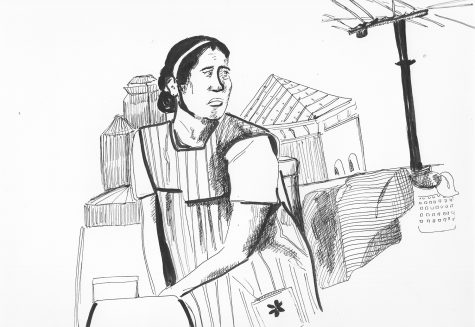“Roma” deserves the biggest screen
January 17, 2019
I should admit that before I sat down to watch “Roma,” I knew almost nothing about it.
I knew that it was a Spanish language film. I knew that it was in black and white.
I also vaguely knew of the soft controversy surrounding the film’s distributor, Netflix, that made it available both on its streaming service and in select theaters.
Some film insiders are suspicious that the growing popularity of Netflix releases will be the death of independent cinema, arguing that the small, non-superhero films deserve a space on the big screen too, not confined to just televisions and iPhones.
So when I got this assignment, I knew that many people were demanding that “Roma” be experienced in theaters.
Here is what “Roma” is about: Set in 1970, the film follows Cleo, a maid who lives in Mexico City. The middle class family she works for is dealing with the temporary departure of their father. Cleo’s life is disrupted when she finds out that she is pregnant.
Directed by Alfonso Cuaron, whose last effort earned him an Oscar for Best Director for the space film “Gravity,” “Roma” is the clear-eyed and patiently observed kind of film that is possible with personal, skillful filmmaking.
It’s a period piece. A political and social observation. A tender portrait of a country, a family and a woman in turmoil. And it weaves itself together almost naturally, miracuously.
In the first seconds, soapy water washes over the tile of the family’s garage as Cleo cleans it, and it sets the entire rhythm of the film, a composed and peaceful quality running throughout. Cuaron, who also wrote, shot and edited the film, gives us scenes in long, uninterrupted shots.
The camera slowly swings back and forth as characters engage with their environments. It is meditative, even in the moments of graphic violence and devastation. Cuaron, who has said the story is loosely autobiographical, delivers a personal work of art.
“Roma” also gives us two of the best film characters of 2018: Cleo and Sofia.
Embodying the quiet will and fierce love and strength of many women we all know, and also don’t know, Yalitza Aparicio is magnificent as Cleo. She devastates and lifts you. The Oscars likely won’t reward her efforts, but it’s much earned.
And Marina de Tavira as Sofia, the mother, electrifies from beginning to end. She’s constantly twisting your judgements and expectations of her: furious, selfish and fraught with betrayal in one moment, deeply regretful and despairing the next but ultimately strong-willed, sensitive and protective of her family.
A large aspect of this film is about class and gender. Both constructs do their best to distinguish us from one another, which often means separate us. They force those from opposing experiences and levels of privilege to consider each other as just that: other.
“Roma” topples this. The film shows us that though resources and boundaries often divides us, every human goes through loss, guilt and restlessness. We’re better off using our capacity to be compassionate with one another to endure, to do good, to be good.
It is here, I suppose, that I should admit that I did watch “Roma” from my living room and not in the theaters. I feel very foolish; so much of the film’s resonance and spectacle earns its place on the big screen.
This so-called “Cynic Cineaste” could give you a long list of self-serving defenses that explain why I didn’t just walk down the street to the Roxy and buy the damn ticket.
I encourage you not to make my mistake. Go see it on the biggest screen possible.
But even if it’s only viewed from your palm, “Roma” feels important, almost necessary, to experience. It will engulf you, and then it will motivate you.








